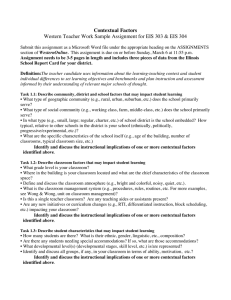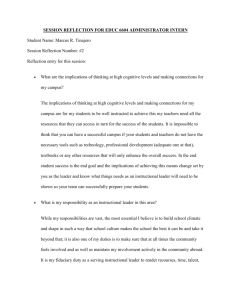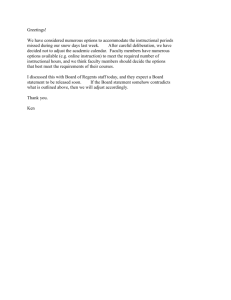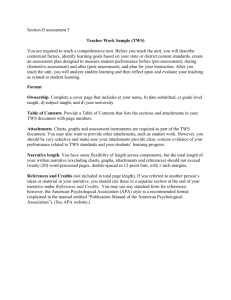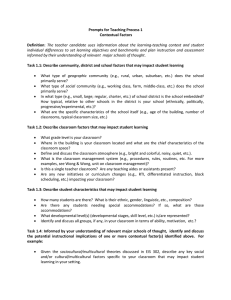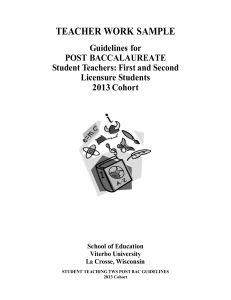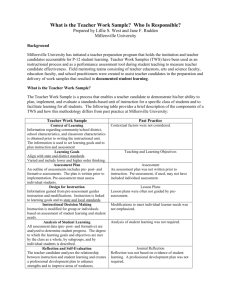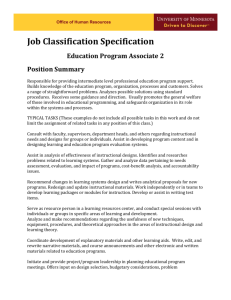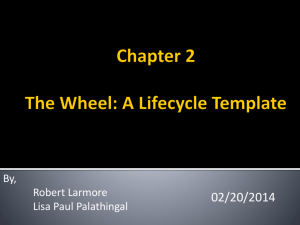Teacher Work Sample Rubric
advertisement
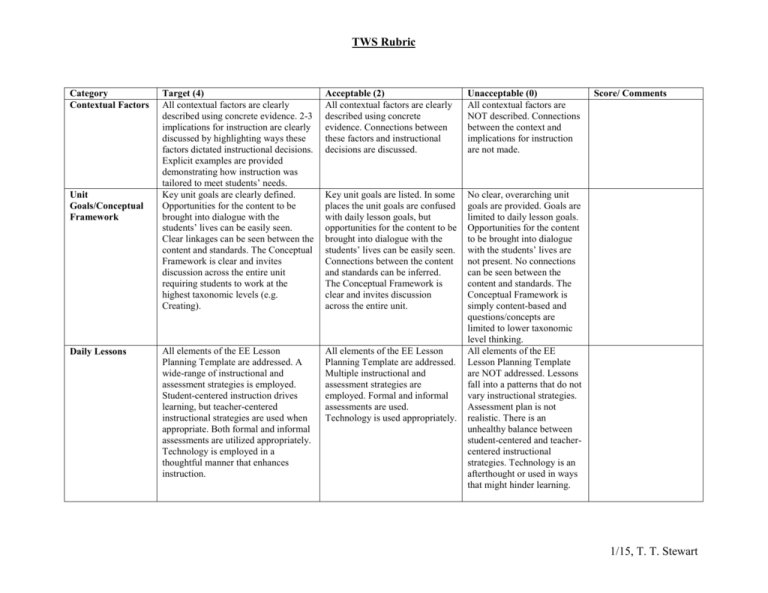
TWS Rubric Category Contextual Factors Unit Goals/Conceptual Framework Daily Lessons Target (4) All contextual factors are clearly described using concrete evidence. 2-3 implications for instruction are clearly discussed by highlighting ways these factors dictated instructional decisions. Explicit examples are provided demonstrating how instruction was tailored to meet students’ needs. Key unit goals are clearly defined. Opportunities for the content to be brought into dialogue with the students’ lives can be easily seen. Clear linkages can be seen between the content and standards. The Conceptual Framework is clear and invites discussion across the entire unit requiring students to work at the highest taxonomic levels (e.g. Creating). Acceptable (2) All contextual factors are clearly described using concrete evidence. Connections between these factors and instructional decisions are discussed. Unacceptable (0) All contextual factors are NOT described. Connections between the context and implications for instruction are not made. Key unit goals are listed. In some places the unit goals are confused with daily lesson goals, but opportunities for the content to be brought into dialogue with the students’ lives can be easily seen. Connections between the content and standards can be inferred. The Conceptual Framework is clear and invites discussion across the entire unit. All elements of the EE Lesson Planning Template are addressed. A wide-range of instructional and assessment strategies is employed. Student-centered instruction drives learning, but teacher-centered instructional strategies are used when appropriate. Both formal and informal assessments are utilized appropriately. Technology is employed in a thoughtful manner that enhances instruction. All elements of the EE Lesson Planning Template are addressed. Multiple instructional and assessment strategies are employed. Formal and informal assessments are used. Technology is used appropriately. No clear, overarching unit goals are provided. Goals are limited to daily lesson goals. Opportunities for the content to be brought into dialogue with the students’ lives are not present. No connections can be seen between the content and standards. The Conceptual Framework is simply content-based and questions/concepts are limited to lower taxonomic level thinking. All elements of the EE Lesson Planning Template are NOT addressed. Lessons fall into a patterns that do not vary instructional strategies. Assessment plan is not realistic. There is an unhealthy balance between student-centered and teachercentered instructional strategies. Technology is an afterthought or used in ways that might hinder learning. Score/ Comments 1/15, T. T. Stewart TWS Rubric Analysis of Student Learning Reflection One key assessment area is clearly described. Valid pre and postassessments in this area are used to develop baseline and data and assess growth. These data are presented in way that demonstrates the amount of gain (or not) for each student. Contextual factors influencing student performance are addressed (where appropriate). Narrative of Whole Class and Diverse Learner subgroups describes what TC learned about student learning. Reflection clearly describes how instruction was crafted and adjusted to meet students’ needs. Effective lessons are highlighted and areas of concern are noted. TC offers suggestions for improving areas of concern. Challenges are clearly described and future goals are outlined. One key assessment area is clearly described. Valid pre and post-assessments in this area are used help develop baseline and assess growth. TC discusses the amount of gain (or not) for each student. Contextual factors influencing student performance are addressed (where appropriate). One key assessment area is NOT clearly described. Pre and post-assessments are invalid (do not measure what has been taught). No baseline data is offered. Contextual factors influencing student performance are NOT addressed (where appropriate). Reflection describes how instruction was adjusted to meet students’ needs. Effective lessons are highlighted and areas of concern are noted. Future goals are outlined. Reflection is superficial and does not describe how instruction was adjusted to meet students’ needs. Successes, challenges and/or future goals are not outlined. Teacher Candidate: ______________________________________________ Comments: Total Score: _______ 1/15, T. T. Stewart
